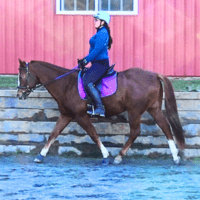Out in the wild as an animal, you either hunt or get hunted. Those who hunt are the predators and those who are hunted are the prey. Horses are considered prey animals. They are among the hunted out in the wild.
Prey animals like horses are always on their guard because they have to be, in order to survive in the wild. If a predator comes their way their best bet is to run as fast as they can, to outrun them and get away. Although this is not always an option, if the horse gets cornered, trapped, or is trying to protect another horse that can’t get away such as a young foal, or another injured horse.
Prey animals will try to fight if they have no other choice. Although with horses some may be more apt to be aggressive and turn to fight more quickly than other horses. Such as some aggressive stallions or mares trying to protect their foals or herd.
There are 3 main characteristics of a horse that distinguish them as a prey animal.
- They smell like the food they eat which is hay and grass.
- Their eyes are located on the sides of their head. This gives them good peripheral or lateral vision, which helps them see when a predator is trying to sneak up on them. However they don’t have good depth perception.
- They have a high awareness and sense of everything going on around them. They are perceptive to people, changes, things and potential dangers.
As humans we contrast the horse as a predator.
- We smell like the food we eat which includes meat, unless you are vegetarian or vegan.
- Our eyes are on the front of our heads which says predator to a horse. We can focus on an object well and have good depth perception. But we don’t have good lateral vision.
- Humans are often not good with being perceptive, to things, changes, people or dangers like a horse is.
So when you work with and ride horses you need to see from the horse’s perspective. You are a predator and the horse is the prey. A horse thinks differently than a predator. A predator has a direct line of thinking, this is what we are going to do, whether it is a lion focusing on the kill or a human with a halter going to catch a horse in the field.
However, the horse’s mind is constantly going and changing trying to figure out where they need to go to flee and get away. When dealing with a human especially when untrained or green, they may think about whether to trust and stay or run away to stay safe.
Seeing as horses are prey animals one thing you must realize is that they do not learn through punishment. This is because when you punish a prey animal they become afraid of you. Horses cannot learn when they are frightened. When a horse is afraid they get consumed by fear and can’t think of anything else. Just to be clear I am not talking about negative reinforcement. I am talking about beating the horse, yelling at the horse or punishing them by scaring them in some way.
Horses see us as predators so when we do this we are confirming to them that we cannot be trusted.
You need to prove to horses that you are not a predator so that they can develop trust. Once a horse trusts you and no longer sees you as a danger or a threat then they will put you in a pecking order. Where do you fit, high or low on the authority and respect scale? When the horse trusts you, you need to make sure you maintain or build respect. This involves moving the horse’s feet. If you can move the horse’s feet you can gain respect, without having to punish the horse.
So when working and riding horses keep in mind your prey-predator relationship, and how your behavior may influence the horse.
Posts In This Series
- Understanding Horse Behavior Before You Work With Horses: Equine Psychology Mini Series | Part 1 Intro
- Horses As Prey Animals: Equine Psychology Mini Series | Part 2
- Horses As Herd Animals: Equine Psychology Mini Series | Part 3
- Horse Instincts: Equine Psychology Mini-Series | Part 4
- Horse Communication 101: Equine Psychology Series Part 5
In the next post coming out Oct 15th we will be going over horses as herd animals. If you want to be emailed the post sign up for the email list.
If you have any questions about horses as prey animals, email me at [email protected] and if it is helpful to others it may be featured in this post.
Cheers, Kacey

